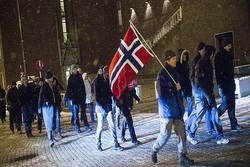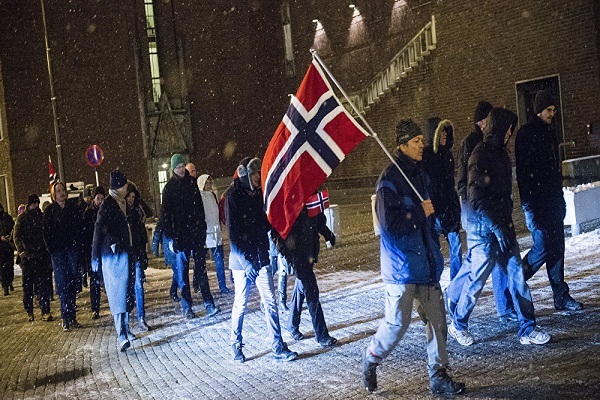One-Third of Norwegians Show Marked Prejudices against Muslims: Surveys


Also many seem to have a great fear of Islam. How did this come to be?
Many Muslims wonder if Norway is a safe place for them to live and practice their faith. Statistics suggest that there is a deep fear of Muslims among the general population of Norway.
In Norwegian, Islamofobia or Muslim-hate are terms used to describe prejudice, fear and hostility against Islam and Muslims. They are terms we regularly see in newspaper reports. But what is the truth behind the headlines?
July 22nd and Islamophobia
Many people may not know the terror attack July 22nd 2011, where 77 people were killed, was partially driven by Islamophobia. The terrorist, Breivik, supports a conspiracy theory where the belief is the political and academic elite in Europe is cooperating with Arab countries in order to increase Muslim immigration.
Known as Eurabia, the conspiracy theory is supported by white supremacists all over the continent. They also think the plan is to destroy European civilization, and make Europe an Islamic colony.
It seems the terrorist viewed the Norwegian Labour Party (Arbeiderpartiet) as representing the elite in Norway, and that he was convinced they were helping Muslims to take over Norway.
By shooting at people aimlessly at the Labour Party's annual summer camp for youth, it looks like he tried to prevent this by destroying their political future. Many of the victims were teenagers, and the devastation was unfathomable.
Although few Norwegians support conspiracy theories openly, there seems to be a deep fear of Muslims in the general population. A survey from 2017 found that 30% of people in Norway agree with the statement: “Muslims want to take over Europe”.
The survey conducted attitudes towards Jews and Muslims, and the conclusion is that around one-third of the population show marked prejudices against Muslims. For example, 39% agree with the statement “Muslims are a threat to Norwegian culture” and almost 50% support the statement “Muslims largely have themselves to blame for the increasing anti-Muslim harassment.”
And although the majority (80%), think such attitudes are common in Norway, few consider it necessary to do something to combat Islamophobia.
Why are so many afraid of Islam?
Many Muslims in Norway feel they are blamed for actions driven by solitary terrorists, and for inhumane practices in the name of Islam.
When prime minister Jonas Gahre Støre reached out to Muslim communities to speak up against radical Islam during the memorial of 22 July this summer, it led to heated debates in the Norwegian media. Representatives for the Islamic community felt this was an attack on all Norwegian Muslims.
Furthermore, they argued Støre contributed to generalized and stereotypical views and Islamophobic attitudes. Strøre, on the other hand, insisted he had good intentions, and that it is important to speak up against all kinds of radicalism.
In Norwegian politics, attitudes with islamophobic components first occurred around 2009 when Siv Jensen, leader of The Progress Party (FrP), introduced the term “stealth islamization” or “sneak islamization”. This was very controversial, because the rhetoric is in fact used by the conspiracy theorists that inspired Breivik.
FrP still defends the use of the term. However, today's leader Sylvi Listhaug emphasizes the party distances themselves from all conspiracies. What they want to describe is when Norwegian society in general has to accommodate special requirements from Muslims.
Examples used by FrP are when Norwegian children have to eat halal at birthday parties, the police allow Muslim women to wear hijabs on passport photos, and that Muslim girls have to have separate swimming lessons from boys.
It set the stage for using the term islamization in the Norwegian public debate. One example described as islamization by others was when Crown Prince Haakon visited an Islamic Center in 2019 and a Muslim woman refused his handshake.
Anti-Islam organizations in Norway
Stop The Islamization of Norway (SIAN), is an organization which fights against what they perceive as increased islamization of Norway. They have around 12,000 followers on Facebook. SIAN holds protests around Norway and runs appeals in the major cities. They also have burned the Quran in public several times.
According to SIAN’s website, Islam is an ideology and movement “contrary to the Constitution of Norway, legislations and Norwegian society”.
Additionally, they claim Islam is “incompatible with democratic and humane values worldwide”. They claim to be not racist or dislike Muslims in general. However, the leader, Lars Thorsen, has previously been convicted for expressing hateful utterances against Muslims.
Is it legal to burn the Quran in Norway?
Yes it is legal, because it is considered a statement towards an ideology, and protected by freedom of speech.
Freedom of speech is a human right in Norway and an essential part of our democracy. Prejudice and expression of hate towards systems and ideologies, including Islam or and religious symbols, is considered within the boundaries of the Constitution.
However, according to the Norwegian criminal code, it is illegal to express hate against a person because of ethnicity, color of skin, or religious beliefs.
As such, there are many gray areas. Burning the Quran in combination with racist comments in public might not be within the boundaries of Norwegian Law.
Political action to prevent Islamophobia
The previous Norwegian Government initiated an action plan to combat discrimination and hatred towards Muslims.
The intention is to decrease islamophobic tendencies, through cooperation with Muslim organizations, dialogue with the police, schools, kindergartens and civil society. In addition, the goal is to increase knowledge in general and especially about the labour market.
The question is if this will result in less prejudice towards Muslims and less fear of Islam in Norway in the future.
Source: lifeinnorway.net



